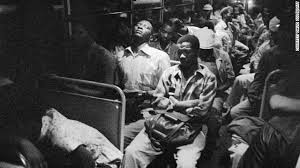Brickfields. Bulawayo. Rhodesia. circa 1952
The police return a few days later. They enlist the help of the whole community. An extensive search is conducted, in the surrounding bush, in the river, down wells. The search goes on all afternoon and well into the night. It is fruitless.
A child is missing. My mother is heartbroken. That child is me.
I have run away after my mother threatens to give me "a hiding", i.e., beating. I assumed she would use her sjambok. I have seen how it can reduce a grown muscular man to a mass of blue-black pulp. So I ran away from home. Making my way to the African location, I boarded a bus bound for a tribal trust land in Lupane, s
 ome 180 kms away.
ome 180 kms away.The bus owner knew me very well. He was a man named Nicholas Scott. At the time he was my favourite uncle. I assured him that my mother had given permission.
As the bus meanders into the African bush, night falls, and the passengers start singing. It is magical. Three, four, five voices join in, join off and rejoin, in a heartwarming meeting of harmonious sound, song and refrain. First one, and another, then another picks up the melody with other voices rich in background chorus, rising and falling, wave upon wave, wave into wave, on and on, drowning the senses in rich, vibrant sustenance of the soul itself. It is magical, soothing and comforting to the unhappy little heart of a lost child, and I soon fall into deep and peaceful sleep.
I spend tthree weeks in the rural area of Lupane, living with different families in their huts in different villages. I am welcomed everywhere, treated with kindness and afforded lodgings and food as if I were a family member. Being a child of Ndebele extraction guarantees that. There is much competition to "claim" me by different families.
This is because I was considered "a catch"; not on account of my brown skin and staightish hair, but because I can do something they have never seen before.
I can walk on my hands and perform hand and fly springs. This I learnt in the Home where we did this almost daily. We could even walk up and down stairs on our hands. Everywhere I go I am heralded as "the one who walks on hands" even though I have told them my name is Ndiweni. Crowds gather to watch, in awe and appreciation, as I demonstrate these weird skills.
Every performance attracts rapturous applause. Many try to emulate me, and there are some comical instances of young urchins almost breaking their little necks, as they near dive onto their heads and roll in a cloud of dust.
Once again I am a hero. Life is good. It is 1952. The community is well knit, seemingly content and happy.

No one is to know that, some 31 years later, in 1983 North Korean trained troops will arrive to, amongst other things, bayonet open the stomachs of pregnant women, on behalf of Robert Mugabe in a search for "dissidents'.
Fortunately, by the time I return home, my movements have been traced by Ginger and it is known that I am safe.
On arrival at home I find my mother sick in bed. She never threatens to beat me again.

